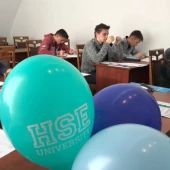It is important to discuss with your friends and family when making a big life decision. But be aware that some of what will occur during these discussions, as well as most of what is found on the internet, is opinion.
Debate is good, but you should always note that the ideas you are handed can be based on misinformation. Nowhere is this truer than the information shared around studying abroad, since the vast swathe of countries, institutions and courses available mean that since there are so many experiences available, rarely will two people have the same one.
You should also be aware that whenever there is a great undertaking to be had, jealous and selfish tongues will undoubtedly start wagging. Wherever there is a risk/reward situation, others love to involve themselves in what they may see as ‘advice’ but is generally a personal fear they are projecting onto others.
Some will be well-meaning; worried about the undertaking and the consequences of studying abroad, but self-belief is what will always prevail and the ‘advice’ given by people is generally parroted and not necessarily true anyway.
So what is it these people say and is there any actual truth to the common misconceptions that are shared about an international education?
Myth #1: Studying abroad is too expensive
Fact: Studying abroad can be cheap and affordable
The cost of studying abroad can vary greatly, depending on the length and type of the course, its location and the manner of institution- whether it be a university, a school, a smaller college or an outside organization.
Some may be considered ‘expensive’ of course, but of the many available courses, these will only constitute a few.
It is in the colleges’ and universities’ best interests to get the best students and that means maintaining affordable degrees and doing their best to make sure accommodation and living expenses don’t get so high as to drive people away. And if you are interested in only spending a term or semester abroad, institutes from your home country will often make the tuition and additional fees the same as those to stay.
Of course, an international education can also be much cheaper than one taken in your home country, especially when taken directly with the international university. Just be beware that the time it takes to organize personally (as opposed to doing it with an agent) will take longer than if the structures and processes are already in place for you.
Myth #2: The only reason people study abroad is to party and have fun
Fact: Studying abroad can be fun, but the main focus should always be education
While there are opportunities for fun and partying when studying abroad, the main focus is evidently studying. Learning and building valuable skills are the key elements of an international education as studying abroad is a rare opportunity that can offer educational possibilities a home education never could.
But of course, studying abroad draws all types and on your travels you may well encounter people who are not particularly interested in the work and instead spend all of their time drinking, lazing around and basically having an extended holiday. This is a personal choice some people make: to enjoy their time more now and enjoy it less later. If that is what you want to do then you are free to do it, but a successful study abroad experience will be made up of a balance of both good hard work and some occasional days off and nights partying.
Let us expand a little more though on the education possibilities of studying abroad that exist both within and outside of the classroom.
It will expand personal horizons, as you will meet people both personally and professionally you may never have had the chance to meet otherwise. It can be both fun and challenging meeting people in a different country but it will always have a positive impact on your academic success, your career and who you are as a person.
Students abroad will learn a completely new system of teaching, taught on subjects and often in a language that can open a whole new world of understanding. Problem solving in a different environment will have to be developed. Personal ideas and beliefs will be challenged, a necessary factor in a good education. There will be a growing appreciation of different cultures and not just the new one in which you may find yourself. These are just a handful of reasons the study abroad experience should be focused on the ‘study’ element.
Myth #3: The only reason to study abroad is to improve your language skills
Fact: Every student in every subject can benefit from an international education
It’s naïve to believe that by staying in the same place you can get an education just as valuable as one you can get elsewhere. Just by virtue of the difference you will learn more, no matter the course and no matter the quality of education that your home country can provide.
Every subject can be taught with a view native to a particular place. You may find that the course structure and focuses may be similar both home and abroad are similar (though not always), but then there is also the type of teaching, the manner in which you are expected to learn personally, the speed at which you are taught, the cultural differences and more.
The most common courses taken by students have historically been in the humanities and languages but that is changing. International programs in the social sciences, business, engineering, maths and sciences have all greatly increased recently as students have been realising the value in a course that challenges them in unexpected ways.
Myth #4: Studying abroad is only for students of a certain age
Fact: Studying abroad is a valuable experience, no matter your age
It’s often the case that younger students see studying abroad as something older students do, while older students see it as something younger students do. The truth is that while students that are still in their teens study abroad more often, there is something to be found by studying internationally at every age. Learning is a lifelong mission, of course.
Whether you are looking for an undergraduate degree, a postgraduate, a PhD or a short course, studying abroad will remain useful and develop your skillset no matter your age.
Myth #5: Students only go and study abroad in Europe
Fact: Students study abroad in virtually every country in the world
While Europe remains a very popular destination, especially the UK, Italy, France, Spain, Germany and Portugal, with North America and Australasia also popular, students are drawn to all sorts of countries you may not expect or have considered. China, Argentina, Costa Rica, Nigeria… Every continent (apart from maybe Antarctica) is available to study in and has been steadily increasing in popularity as students continue to realise a good education can be had almost anywhere. This is especially true of countries with quickly rising economies, like Ethiopia, Turkey, India, Tanzania and Vietnam.
Myth #6: Studying abroad is only for a certain type of person
Fact: Anybody can study abroad, no matter race, religion, disability or anything that doesn’t fit the ‘stereotype’
If you want to study abroad, you can do it. If you feel like there’s a picture in your head of a person who can study abroad and that your differences to this imaginary person preclude you from doing so, you have to understand this image you have is incorrect. Studying abroad is possible and necessary for everyone.
What could be more inclusive than an education abroad? If you have studied abroad before, you will know that once you begin your course you will meet people from all over the world, from all sorts of different background and countries and experiences. One of the delights of the experience is to meet different people but what is rarely mentioned is that this doesn’t just include people from the country in which you study. It includes all of the other students from every corner of the globe who will have the same interests and attitudes as you.
If this remains a concern then there are groups like Diversity Abroad, MIUSA and NAFSA Special Interest Group that can support you on your study abroad journey.
Myth #7: There aren’t many study abroad scholarships available
Fact: There are many scholarships for students studying abroad
Based on merit, financial need and specialized needs, most universities have a scholarship framework in place, with amounts, deadlines, restrictions and process all set, so make sure you look to see which are available at the university you are applying to as soon as possible.
Scholarships may also be targeted for diversity or geography, for students in need of a lot of financial help or if your family does not have a university education.
Scholarships can also be offered by private organizations and governments, both home and abroad.
If you are searching for a scholarship, begin by contacting the university you are interested in for advice, as well as looking online for scholarship directories.
Myth #8: Instead of studying abroad, you should just travel instead, it’s the same thing
Fact: There is a great deal of difference between independent travel and studying abroad
As suggested, studying abroad will often include some studying, whereas travelling likely won’t have too much of that.
When you study abroad, getting to explore and travel and be a bit of a tourist from time to time are some of the perks, but of course, it isn’t the main focus of the journey, which is studying and understanding and living in a different culture.
Practicing your language skills with students, communicating with new friends and spending time integrating yourself is far more worthwhile than the ‘browsing’ nature of general travel. Visiting a place for a holiday is a very much surface level activity and you can get far more out of a study abroad trip by taking the time to stay local and explore the community that surrounds you, rather than just simply going to a major tourist sight and taking photographs.
Myth #9: Studying abroad means it will take longer to graduate
Fact: With good planning, you can graduate on time, or even faster
If the entirety of your course will be held abroad, of course the length of time the course takes will differ, but a variety of course lengths available means you get to choose how long you would like to study for.
If you plan on only spending a year, or a semester abroad and you are concerned the course credits may not transfer equally, then don’t worry! Students that study abroad are significantly more likely to graduate in general and there are often accelerated classes available abroad that you may not otherwise have the chance to take part in.
Students that study abroad are also likely to return home with a reinvigorated interest in academics and a renewed passion for learning.
Myth #10: Businesses don’t care if you studied abroad
Fact: Some of the most employable traits are accrued by studying abroad
Increasingly, employers want workers that are culturally astute and can speak another language. Of course there are many ways of gathering these skills but by studying abroad you will not only improve in these aspects but also acquire marketable international qualifications, prove you can work with all manner of people and have the gall to take a chance and move to a different place and challenge yourself.
But of course you can’t just write ‘I studied abroad’ on your resume- you have to showcase and market yourself to potential employers, detailing what you learned, how the experience made you a better person and how that will influence the ideas you have for your new role.
The Facts of the Matter
So there you have it. If you are considering studying abroad, you may have thought or heard a few of these. Brace yourself to hear a few more before you finally get on that plane. But if you are someone who is put off studying abroad by any of these ideas, we urge you to do a little research and find out why there are so many great reasons to go and study abroad.
The process of finding a destination, university and course can be tricky, of that there is no doubt- there are all sorts of big and small things that are needed to know before a final decision is made, but that is why there is so much help available from articles such as this, to education fairs, to the information offered by governments and the institutions themselves.










